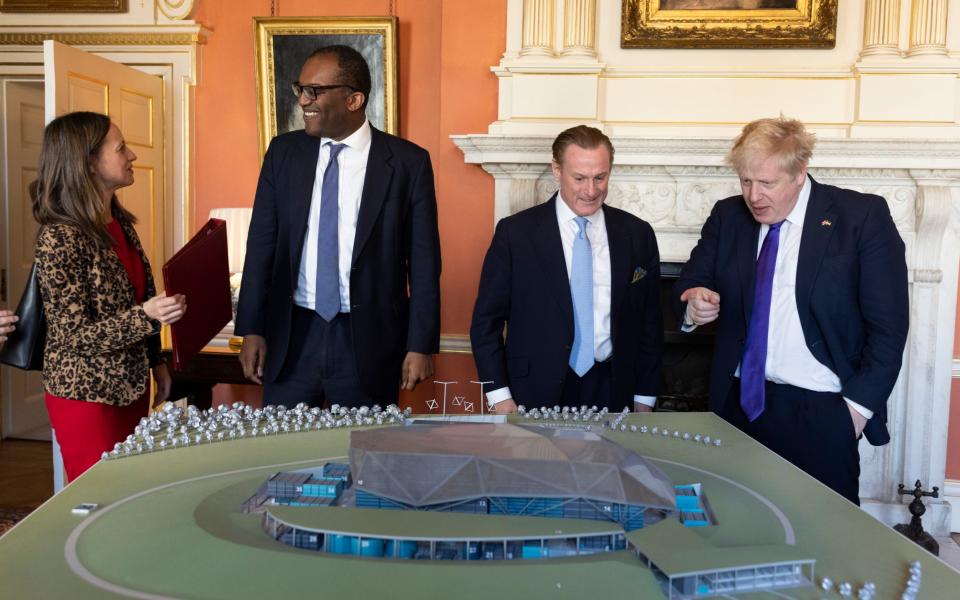Boris Johnson prepares planning overhaul to speed up nuclear power plants

Boris Johnson is readying an overhaul of planning laws to speed up the building of nuclear power stations as Europe fights to wean itself off Russian gas.
At a meeting with senior energy executives in Downing Street, ministers indicated that they were considering reforming rules to make it more difficult for residents and officials to object to the construction of new nuclear sites.
Mr Johnson has previously pledged to put "big bets on nuclear power" as a way of shoring up UK energy security following the Russian invasion of Ukraine and concerns about the cost of imported fossil fuel.
Local people may have their ability to oppose new plants stripped away under proposals being considered by ministers, but industry bosses are more concerned about the Environment Agency and Marine Management Organisation wrapping their projects in red tape and slowing them down, The Telegraph understands.
Nuclear power stations provide about 15pc of the UK’s electricity. However, all but one of them are due to close by 2030 despite government ambitions for their capacity to increase fivefold in the 20 years after that.
Ministers are aiming to deliver more nuclear power at "warp speed" and want it to be responsible for a quarter of Britain's energy mix by 2050. Kwasi Kwarteng, the Business Secretary, is pushing for a new nuclear task force that would be responsible for delivering the project.
The meeting came as No10 admitted Mr Johnson’s energy security strategy has been delayed again until next week, amid reports that the Treasury attempted to block the building of more power stations because of concerns about the cost.
Mr Johnson’s official spokesman denied there had been a disagreement over strategy between the Prime Minister and Rishi Sunak, the Chancellor.
Ministers are also concerned about the private financing needed for their new energy projects, including nuclear power stations and oil and gas rigs in the North Sea.
The North Sea Transition Authority - the new name for the Oil and Gas Authority - plans to hold its first new licensing round for oil and gas fields since 2020, which its chief executive said would be “pretty much ready to go” if companies are willing to drill them.
Helen Whately, the Exchequer Secretary to the Treasury, also met lenders on Monday in a bid to persuade them they should invest in UK fossil fuels despite environmental, social and governance (ESG) targets to sell out of the industry.
A source close to the discussions said: "It's all well and good issuing licences for the North Sea oil sector but a lot of banks are restricting lending on the basis that they have been told by activist shareholders to divest.
“Nowadays funds want to show off their 'ESGness'. It is increasingly difficult to encourage them to invest in fossil fuel companies, but choking off finance now causes difficulties down the line."
Insurers including Aviva Investors and Legal & General also used Monday's nuclear summit to urge the Treasury to speed up plans to scrap Solvency II, an EU regulation that prevents insurance companies from investing in national infrastructure projects.
Downing Street said that the meeting was used to discuss “removing barriers facing development” of nuclear power, but Whitehall and industry sources said planning regulation was a major concern for potential developers.

Rolls-Royce, which has begun the approval process to build new small reactors a seventh of the power of a traditional station but only a twelfth of the cost, is expected to play a key part in the shift to nuclear energy alongside the likes of EDF.
Ministers are considering introducing a new “net zero duty” that would force environmental regulators to factor in the Government’s desire to increase UK energy production and make it “harder for them to block nuclear projects”, a source said.
Following a record four year inquiry and 16m words of evidence to approve the building of Sizewell B in 1985, reforms could also restrict local people from opposing nuclear plants near their homes.
Next week’s energy security strategy is likely to contain a heavy focus on nuclear power and oil and gas drilling. Ministers are not expected to change the Government’s policy on fracking, which has been forbidden since the 2019 general election.
Downing Street said the fact the strategy had been delayed twice was “a factor of wanting to make sure we have a comprehensive approach”.

 Yahoo Finance
Yahoo Finance 